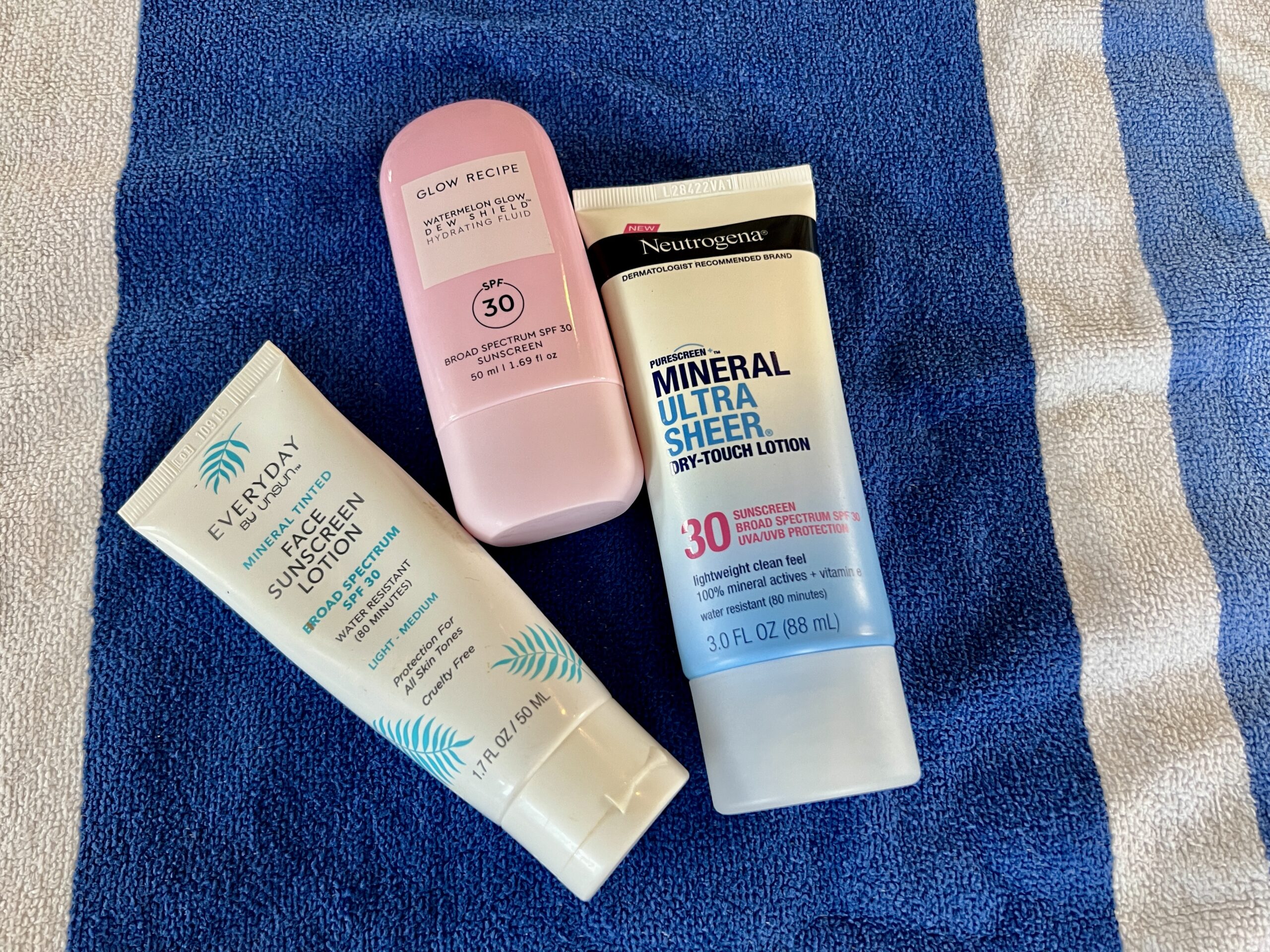Cafeteria Food Waste Recycling Program Launches at Hall

Audio By Carbonatix
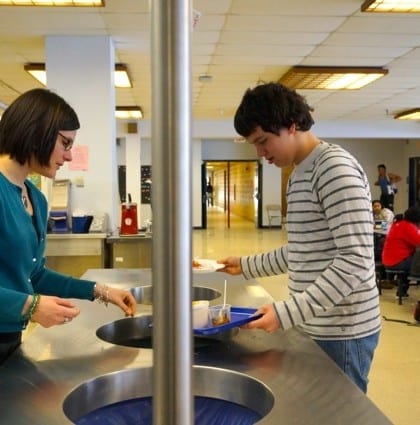
Hall science teacher Kathleen Coghill, faculty advisor to the Environmental Club, instructs a student on sorting his waste. Photo credit: Ronni Newton
Students at West Hartford’s Hall High School kicked off a food waste recycling program Wednesday at the cafeteria’s new recycling station.
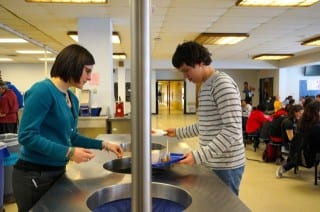
Hall science teacher Kathleen Coghill, faculty advisor to the Environmental Club, instructs student Gregory Donovan on sorting his waste. Photo credit: Ronni Newton
By Ronni Newton
Students at West Hartford’s Hall High School will be doing their part to keep recyclables out of the waste stream with a cafeteria recycling station that was launched during Wednesday’s lunch periods.
“We tried to involve as many students as possible” in bringing a recycling program to Hall, said Kathleen Coghill, a science teacher who serves as the faculty advisor to the school’s Environmental Club. The “Link Crew” was trained on how to use the recycling station, and they in turn trained the rest of the student body during Wednesday morning’s advisory homeroom period, she said. Link Crew is a group of students formed to assist with freshman orientation, which is now taking on more responsibility in other school-wide initiatives, Coghill said.
The cafeteria recycling station includes separate bins for “recyclables,” “food and compostables,” and “garbage.” There is also a space where liquids can be dumped out so that the containers can be recycled.
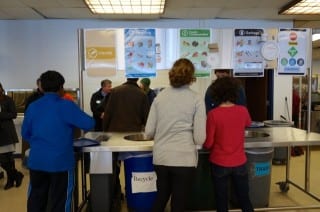
Students use the new cafeteria recycling station at West Hartford’s Hall High School. Photo credit: Ronni Newton
The effort to bring the recycling station to Hall’s cafeteria was truly a grassroots effort, with the initial impetus coming from the school’s Environmental Club. West Hartford’s Public Works, Plant Services, and Nutrition Services departments, as well as the Clean Energy Task Force, were all for the project which was spearheaded by West Hartford Energy Specialist Catherine Diviney. Representatives from all of those organizations, as well as Neil Belleville whose Warehouse Store Fixtures business constructed the recycling station, were all present at the launch.
“Changing behavior is key,” Diviney said.
Food Services Director Trish Molloy said that kitchen staff has been separating waste into categories that include compostables since September 2014, but the material still ended up going into the trash because there was not yet a contract in place for alternative disposal.
Hall is the first school in West Hartford to implement a recycling station for the students in the cafeteria, and soon both the kitchen compostables and the cafeteria compostables will be hauled to a site in Ellington.
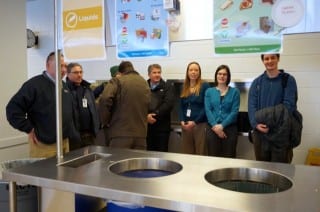
Representatives from West Hartford’s Public Works, Plant Services, and Nutrition Services departments, the Clean Energy Task Force, Warehouse Store Fixture Company, and Hall’s Environmental Club were on hand for the launch of the cafeteria’s recycling station. Photo credit: Ronni Newton
According to Director of Public Works John Phillips, West Hartford is about to sign the contract with Blue Earth Compost for pick-up of the food scraps. “They are a small local contractor, and they fit perfectly for this application,” Phillips said.
It will cost the town $45o per month for pick-up and disposal of Hall’s compostable food waste, said Phillips. “We have to look at the big picture,” he said. “We may be paying a little more for transport [right now], but long-term we hope to reduce the amount of trash we are hauling.”
Phillips hopes to eventually expand pick-up of compostable material to not just the schools, but to all residents. It may take a decade or more before there is a positive financial impact on overall trash collection fees, however Phillips said it’s “all about sustainability.”
“We shouldn’t be throwing food in a hole in the ground or burning it when another opportunity for proper disposal exists,” said Phillips. “We’re continually trying to balance the right thing to do in waste management with the cost savings, and there’s a better option for food scraps.”
“This is a baby step to bringing this mindset to the entire community,” said Phillips. He sees it as an opportunity for the Hall students to become the town’s first “curbside champions” for food waste recycling. And even though it may be new to West Hartford, food waste recycling is already common practice on many college campuses, in major cities, and throughout Canada, he said.
Phillips said that timeline for expansion of food waste recycling will be an “organic process,” and he will analyze data from the pilot program at Hall before taking the next step.
However, there are already plans in place to place recycling stations in West Hartford’s other public schools, beginning with Conard.
“We want to get [a recycling station] underway at Conard. We plan to do it for Earth Day,” said Manager of Building Services Paul Edlund. He’s hoping to get his daughter, a Conard junior, to help get the program going there.
“Next September we hope to get everyone else on board, to have at least one station at each school by September,” Edlund said.
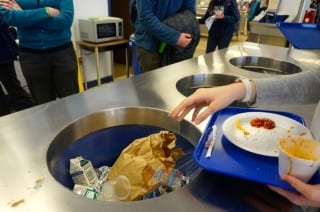
Recyclables like paper and plastics go into this bin. Photo credit: Ronni Newton
The reaction from the Hall students was positive, with most easily figuring out how to properly dispose of items left on their lunch trays. Coghill, Environmental Club President John Wright, and others were on hand to provide assistance when needed.
“Once you do it once, you will know how to do it,” Phillips said, stressing that it is important for the students to follow the instructions on the signage at the recycling station even the industry has an allowable margin for contamination.
Liquids – even water – can be a big contaminent in the recycling stream, Phillips said. Plastic containers don’t need to be rinsed, he said, but if there is sticky food waste that can’t be removed from an otherwise recyclable container, it should all be thrown in the trash.
“It starts with the kids, the energy here. This is grassroots at its best,” Phillips said.
Like what you see here? Click here to subscribe to We-Ha’s newsletter so you’ll always be in the know about what’s happening in West Hartford!



